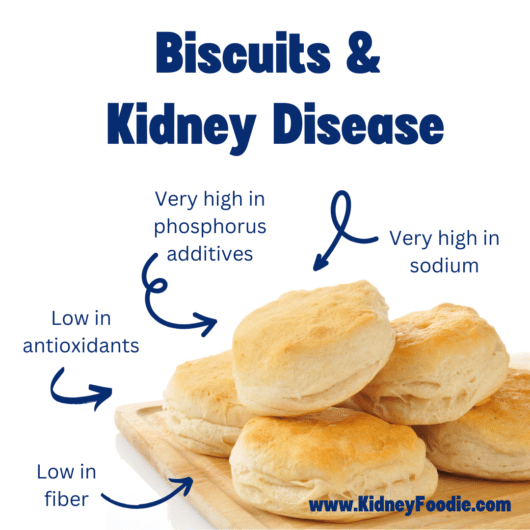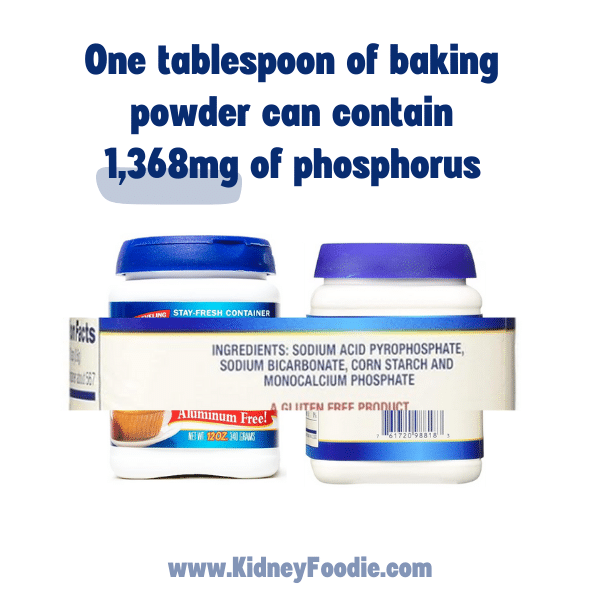I’m from the south where you can get a biscuit at just about any restaurant you go to. Biscuits are delicious. There is no way around that.
This post may contain affiliate links through which we may earn a small commission to help keep this website free.
But biscuits are NOT kidney friendly – at least not the ones you can buy at the store or a typical restaurant.
Why are biscuits bad for kidneys?
There are a couple of things that make biscuits not-so-friendly for the kidneys:
- Biscuits are high in sodium. We typically consider a food to be low in sodium if there is less sodium than calories. Most biscuits have substantially more sodium than calories. For example, a Grand’s Southern Style Biscuit has 180 calories and 470mg of sodium – so almost 300mg more sodium than calories!
- Biscuits are low in fiber. Fiber is essential for helping to prevent constipation and maintain normal potassium levels. Biscuits are typically made with refined flour which means the natural fiber has been removed. This also means that the carbohydrates in biscuits will be absorbed faster and will spike blood sugars higher in those individuals who also have diabetes.
- Biscuits are loaded with phosphorus additives, which are not good for your cardiovascular system. Phosphorus additives are highly absorbed by the body, and can build up easily in people who have Chronic Kidney Disease.

Phosphorus in Biscuits
The phosphorus in biscuits is probably the most problematic aspect of biscuits simply because they contain so much.
The recommended daily allowance for phosphorus is 700mg per day. According to the USDA database, here is how much phosphorus biscuits might have:
- Biscuit from refrigerated dough: 201mg per biscuit, 28.7% RDA
- KFC Biscuit: 264mg per biscuit, 37.7% RDA
- Popeye’s Biscuit: 185mg per biscuit, 26.4% RDA
- McDonald’s Sausage Biscuit: 378mg per biscuit, 54% RDA
Biscuits contain a LOT of phosphorus. The reason they are so high in phosphorus is because they require a lot of baking powder in order to get nice and fluffy.
Baking powder is essentially just one big phosphorus additive. In some cases, every single ingredient in baking powder is a phosphorus containing substance. Just one tablespoon of baking powder can contain 1,368mg of phosphorus.

The first recipe that I clicked on when searching for a biscuit recipe called for TWO tablespoons of baking powder to make 10 biscuits. That would be 273mg of phosphorus additives per biscuit ON TOP of whatever naturally occurring phosphorus there is in the other ingredients. That is a lot of phosphorus.
Kidney Friendly Biscuit Options
Kidney Friendly Store Bought Biscuits and Restaurant Biscuits
According to the USDA Food Data Central Database, there are no pre-made biscuit options that do not contain a phosphorus additive.
I downloaded the entire database from December 2023 and sifted through every biscuit entry. The only biscuits listed without phosphorus additives are cookie-style biscuits (which don’t count since those are cookies, not biscuits).
There is very limited data available on restaurant food. Restaurants are not required to provide ingredient information, although larger chains do provide information on allergens. Larger chains are required to provide some nutrition information, but phosphorus is never reported.
Based on the fact that all store bought biscuits contain phosphorus additives, I think it is safe to assume that restaurant biscuits will also contain a large amount of phosphorus additives.
Below I will discuss how to make a more kidney friendly biscuit from scratch, however this is not always something that people want to do. If you do not want to make your own from scratch, then I would encourage you to view biscuits as a once-in-awhile treat rather than an every day food.

Kidney Friendly Biscuit Recipe
It is possible to make a kidney friendly biscuit from scratch (or at least a kidney friendlier biscuit). If we go back to that recipe that I found on google, it called for the following ingredients:
- 2.5 cups of all-purpose flour
- 2 tablespoons baking powder
- 1 teaspoon of salt
- 1 stick of unsalted butter
- 1 cup + 2 tablespoons buttermilk
- 2 teaspoons honey
If you make these biscuits using a phosphorus containing baking powder, here is the nutrition for one biscuit (and the recipe makes 10):
- Calories: 216
- Protein: 4.5g
- Fat: 10g
- Carbohydrates: 27g
- Fiber: <1g
- Phosphorus: 333mg
- Potassium: 87mg
- Sodium: 482mg
If you swap out the regular baking powder with kidney friendly baking powder made of sodium bicarbonate and cream of tartar, here is the updated nutrition information:
- Calories: 218
- Protein: 4.5g
- Fat: 10g
- Carbohydrates: 27g
- Fiber: <1g
- Phosphorus: 59mg
- Potassium: 285mg
- Sodium: 516mg
Now, you can see that the phosphorus content is now drastically lower (from 33mg of mostly phosphorus additives to just 59mg of natural phosphorus that is poorly absorbed).
However, the biscuits are now higher in sodium because the baking soda in the kidney friendly baking powder has sodium. You can offset this by adjusting the amount of salt that is called for in a recipe. If we switch to ¾ of a teaspoon of sodium in the recipe, each biscuit would only have 458mg of sodium which is similar to what it had in the original recipe.
I have intentionally not listed out a full recipe with step-by-step instructions because I do not claim to know what the perfect biscuit recipe is. However, all biscuit recipes are similar and will likely require the same tweaks to make them more kidney friendly.
To make a biscuit recipe more kidney friendly, swap out the baking powder for kidney friendly powder and reduce the amount of salt called for in the recipe. This will substantially lower the phosphorus content while keeping the sodium content similar.
If you make biscuits like that, they will be more kidney friendly – although still not what I would consider a healthy food since they will still be high in sodium, low in fiber, and low in antioxidants.
You can also experiment with further lowering the amount of sodium called for in a recipe. The longer you practice following a low sodium diet, the easier it is the lower the sodium in foods without finding them bland.
Lastly, you may be wondering about the potassium in the biscuits. The original biscuit recipe may have been high in phosphorus, but it was much lower in potassium. The more kidney friendly recipe now has 285mg of potassium in it.
While that is a higher amount of potassium, keep in mind that your goal with potassium is not to eat as little as possible. Your body still needs potassium, and you may not need to limit potassium in your diet. There are many things that can cause potassium levels to be out of range that are not related to the potassium content of the foods that you eat.
You may also find recipes that call for less baking powder. After searching for a bit, I came across many biscuit recipes that used less baking powder (but still had great reviews!). Using less kidney friendly baking powder would result in adding less potassium to recipes.
